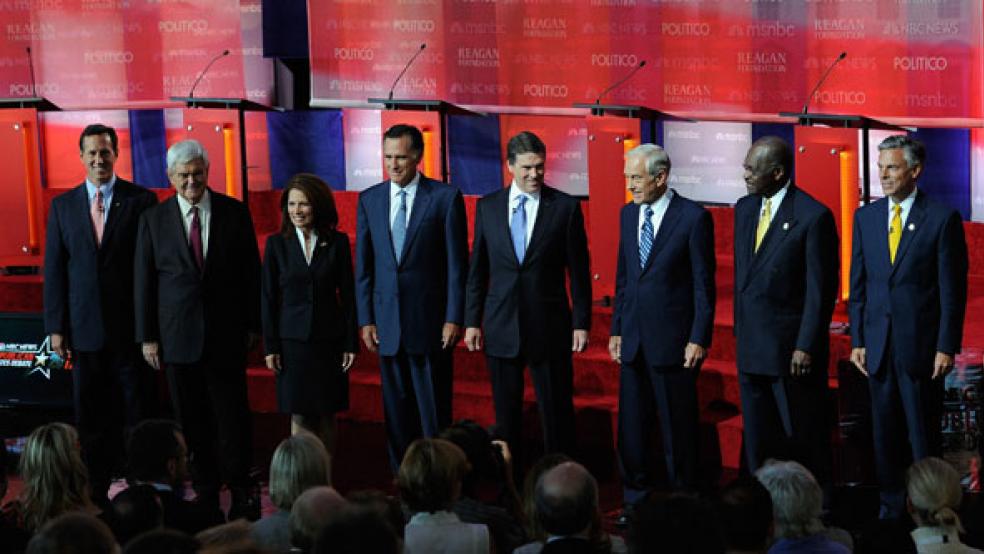Rick Perry may not like environmentalists, Ron Paul may loathe central bankers, and Michelle Bachman may look askance at people who believe in evolution (or vaccination). But nobody in the GOP doesn’t like entrepreneurs. In the hierarchy of GOP applause generators, “job creators” rank just below Ayn Rand and Seal Team 6.
For the most part, small business owners return the affection. Republicans dominate among candidates endorsed by the National Federation of Independent Businesses, the nominally nonpartisan small business lobby. Serial entrepreneur and Inc. Magazine columnist Norm Brodsky spoke for many of his peers when he told me, “We feel like we’ve done some good for the economy, and we don’t think we should be punished for it” with higher taxes and new regulations. Not surprisingly, legislation to reduce those two scourges forms the pillars of the Senate Republicans’ jobs plan unveiled last week.
So, who loves ya, job creator? Republicans do.
Or do they, really? If the GOP truly loved job creators, especially in this economy, you’d think they’d focus more on, well, job creation. Regulation and taxes may be a pain, but survey of small business owners last month by McClatchy newspapers, and even last week’s release of the NFIB’s Small Business Optimism Index, suggest that weak demand is the main reason small businesses aren’t hiring, not regulation or taxes. In a review of past data from the NFIB index, Economic Policy Institute economist Lawrence Mishel picks apart the claim that there has been any recent surge in small business angst over taxes and regulation.
... Small businesses have always complained about regulation and taxes and not especially so under Obama. For instance, the share concerned about regulation under Obama (13.9 percent) is not substantially higher than under George W. Bush (9.9 percent and 11.0 percent) or Ronald Reagan’s second term (12.8 percent). There is also less concern about regulation under Obama than under Bill Clinton or George H. W. Bush. Recall also that there was rapid employment growth in the second Clinton term, so high concerns about regulation...are not necessarily associated with poor employment growth.
But what about the millionaire’s surtax, recently proposed by Senate Democrats? Wouldn’t that dampen the animal spirits of small business job creators? Well, only those who clear more than a million dollars in profits and pass it through as personal income—which means, essentially, very few. Waverly Deutsch, clinical professor of entrepreneurship at the University of Chicago Booth School of Business, said that of the six million businesses in America that have employees (as opposed to being sole proprietorships), 76% have sales under $1 million. “Once you take out the business deductions, it’s clear that these businesses aren’t paying taxes on anything close to $1 million.”
It’s hard, too, to find much love for owners in the GOP’s recent attacks on the Fed. The Fed’s decision last month to try to nudge the economy at the margins by swapping short-term debt for long-term debt drew an unprecedented letter from GOP leaders in the House and Senate. Political meddling with the Federal Reserve serves no one’s interest, and how is it in business owners’ interest in particular to squelch a modest attempt to boost the economy? Seriously, now -- how many entrepreneurs will curtail hiring plans because they fear the weighted maturity of the Fed’s balance sheet is too high?
So, here’s the hard truth, job creator: It may be that your most ardent admirers in Washington don’t really love you for your real qualities—your perseverance, innovation, faith in free enterprise, and guts. They are just using you to get close to their real crush, which is smaller government.
If the GOP really wanted to improve job creation, it would facilitate what every small business advocate and every mainstream economist has been urging Washington to do since the debt-ceiling debate: Compromise on a responsible economic package that promotes growth in the short run and credibly reduces the deficit in the long run. The GOP’s recent behavior suggests that no such thing will happen before November 2012.
Maybe you can’t hurry love. But that’s a long time to keep a job creator waiting.
Eric Schurenberg is the editor of Inc.com .






